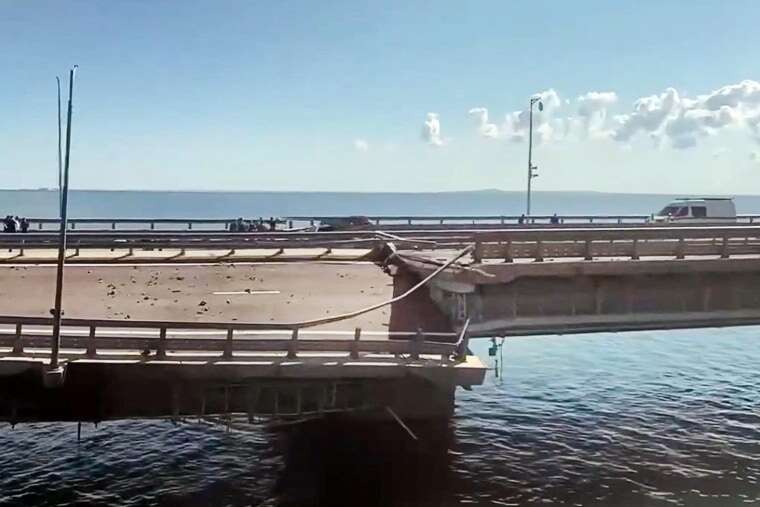MOSCOW: Russia said on Monday that it had halted participation in a landmark UN-brokered deal which allowed Ukrainian grain to be exported through the Black Sea just hours after Moscow said Ukraine had attacked the Crimean Bridge.
Two people were killed and their daughter was wounded in what Russia cast as a terrorist attack on a major artery for Russian troops fighting in Ukraine and a prestige project personally opened by President Vladimir Putin.
Blasts were reported before dawn on the 19-km (12-mile) road and rail bridge linking Russia to Crimea, which Russia annexed from Ukraine in 2014.
The Kremlin said the halting of the Black Sea grain deal, brokered by the United Nations and Turkey to combat a global food crisis worsened by Russia’s invasion of Ukraine, had nothing to do with the bridge attack.
“In fact, the Black Sea agreements ceased to be valid today,” Kremlin spokesman Dmitry Peskov told reporters on a conference call.
“Unfortunately, the part of these Black Sea agreements concerning Russia has not been implemented so far, so its effect is terminated.”
Russia has notified Turkey, Ukraine and the U.N. that Moscow is against extending the deal, Maria Zakharova, a spokeswoman for Russia’s foreign ministry, said.
The Chicago Board of Trade’s most active wheat contract was up 3.4% at $6.84 a bushel by 0910 GMT after earlier rising over 4%.
Russia and Ukraine are two of the world’s top agricultural producers, and major players in the wheat, barley, maize, rapeseed, rapeseed oil, sunflower seed and sunflower oil markets. Russia is also dominant in the fertiliser market.
GRAIN
Putin said last week that the parts of the deal relating to Russia had not been implemented and so he was thinking of suspending Russia’s participation to focus minds and that Russia would return to the deal once its conditions were met.
To convince Russia to agree to the Black Sea deal, a three-year deal was also struck in July 2022 under which U.N. officials agreed to help Russia get its food and fertilizer exports to foreign markets.
While Russian exports of food and fertilizer are not subject to Western sanctions imposed after Russia’s invasion, Moscow has said restrictions on payments, logistics and insurance have amounted to a barrier to shipments.
Russia has agreed three times in the past year to extend the Black Sea deal, but also briefly suspended its participation at the end of October in response to a drone attack on its fleet in Crimea.
“We can suspend our participation in the deal, and if everyone once again says that all the promises made to us will be fulfilled, then let them fulfil this promise. We will immediately rejoin this deal,” Putin said last week.
Russia also has complained that not enough grain has reached poor countries.
The United Nations has argued that the arrangement has benefited those states by helping lower food prices more than 20% globally.


Comments are closed.